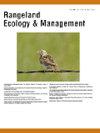The Degradation of Rangelands in Mongolia: An Actor-Centered Institutionalist Approach
IF 2.4
3区 环境科学与生态学
Q2 ECOLOGY
引用次数: 0
Abstract
In Mongolia, 65% of rangelands are degraded to variable extent compared to their reference state. Despite numerous efforts, a regulatory instrument in the form of a Rangeland Law has not yet been adopted and implemented. Previous studies have focused on the degradation of rangelands through investigations of vegetation, and of institutions responsible for land regulations. However, no study has yet attempted to analyze this regulatory gap (i.e., the absence of Rangeland Law), and studies on interlinkages between the institutional void and rangeland degradation continue to be rare in Mongolia. By employing a qualitative research method involving policy documents and semistructured interviews, this study addresses these gaps from a novel perspective by examining the institutional and actor-oriented factors that have impeded the adoption of the Rangeland Law for the past decades based on the Actor-Centered Institutionalism framework. The research findings indicate that institutional factors influence the adoption of the Rangeland Law more strongly than actor-oriented factors and that the challenges facing rangeland governance in Mongolia are deeply intertwined with political dynamics and vested interests. Addressing these challenges requires an effort to depoliticize the discourse, to prioritize sustainable management practices, and to safeguard the cultural heritage and well-being of Mongolia’s herding communities.
蒙古牧场退化:以行动者为中心的制度主义研究方法
在蒙古,与参考状态相比,65%的牧场有不同程度的退化。尽管作出了许多努力,但仍未通过和执行以《牧场法》为形式的管制文书。以前的研究主要是通过调查植被和负责土地管理的机构来关注牧场的退化。然而,尚未有研究试图分析这一管理缺口(即没有牧地法),而且关于制度空白与牧地退化之间相互联系的研究在蒙古仍然很少。本研究采用定性研究方法,包括政策文件和半结构化访谈,在以行为主体为中心的制度主义框架下,通过研究过去几十年来阻碍《牧场法》通过的制度和行为主体导向因素,从一个新的角度解决了这些差距。研究结果表明,制度因素对《牧场法》实施的影响强于行为主体导向因素,蒙古牧场治理面临的挑战与政治动态和既得利益密切相关。应对这些挑战需要努力使话语非政治化,优先考虑可持续管理实践,并保护蒙古牧民社区的文化遗产和福祉。
本文章由计算机程序翻译,如有差异,请以英文原文为准。
求助全文
约1分钟内获得全文
求助全文
来源期刊

Rangeland Ecology & Management
农林科学-环境科学
CiteScore
4.60
自引率
13.00%
发文量
87
审稿时长
12-24 weeks
期刊介绍:
Rangeland Ecology & Management publishes all topics-including ecology, management, socioeconomic and policy-pertaining to global rangelands. The journal''s mission is to inform academics, ecosystem managers and policy makers of science-based information to promote sound rangeland stewardship. Author submissions are published in five manuscript categories: original research papers, high-profile forum topics, concept syntheses, as well as research and technical notes.
Rangelands represent approximately 50% of the Earth''s land area and provision multiple ecosystem services for large human populations. This expansive and diverse land area functions as coupled human-ecological systems. Knowledge of both social and biophysical system components and their interactions represent the foundation for informed rangeland stewardship. Rangeland Ecology & Management uniquely integrates information from multiple system components to address current and pending challenges confronting global rangelands.
 求助内容:
求助内容: 应助结果提醒方式:
应助结果提醒方式:


